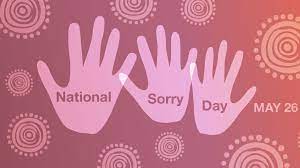Tuesday this week (26 May) was National Sorry Day. This day commemorates the day the landmark Bringing them Home report was tabled in federal parliament. This was the final report of the National Inquiry into the Separation of Aboriginal and Torres Strait Islander Children from Their Families and was conducted by the Human Rights and Equal Opportunity Commission (now called the Australian Human Rights Commission) between 1995 and 1997. On 26 May 1998, the first National Sorry Day was held to commemorate the anniversary of the report and remember the grief, suffering and injustice experienced by the stolen generations.
On this year’s National Sorry Day two events took place which indicate why we still need to acknowledge this day and why injustice towards our indigenous people is still systemic within Australian society.
The first was the news stories, carried by all major outlets, of the destruction of 46,000 year old rock art by mining company, Rio Tinto. According the the Guardian article:
The cave in Juukan Gorge in the Hammersley Ranges, about 60km from Mt Tom Price, is one of the oldest in the western Pilbara region and the only inland site in Australia to show signs of continual human occupation through the last Ice Age. It was blasted along with another sacred site on Sunday. Mining company Rio Tinto received ministerial consent to destroy or damage the site in 2013 under WA’s outdated Aboriginal heritage laws, which were drafted in 1972 to favour mining proponents.
Rio Tinto’s defense was that the blasting was legal. In that, they seem to be correct. However, that merely serves to illustrate the systematic nature of the injustice and racism within our society. We were rightly shocked and indignant when the Taliban destroyed ancient religious objects in Afghanistan. We were similarly outraged when antiquities in Syria were destroyed by ISIS. However, the deliberate and legal destruction of sites much more ancient in Australia in order to extract iron ore has passed with barely a whimper. Not only does this show that social responsibility policies at Rio Tinto aren’t worth the paper they are written on, but that, as a society, we simply do not value the heritage of our indigenous people.
The second event was a speech by the Prime Minister. Here is a quote from that speech:
| “[The second principle governing the government’s return to pre-COVID economy] is caring for country, a principle that indigenous Australians have practiced for tens of thousands of years… Responsible management and stewardship of what has been left to us to sustainably manage for current and future generations. We must not borrow from future generations what we cannot return to them. This is as much true for our environmental, cultural and natural resources as it for our economic and financial ones. Governments must live within their means, to not impose impossible debt burdens on future generations.” |
To quote from journalist Andrew Street,
| Did you catch that? On Sorry Day 2020 the Prime Minister of Australia co-opted the language of Aboriginal stewardship of the land to announce plans for the imposition of austerity economics – policies which, as the last seven years have made very clear, have had devastating effects on poor and remote communities in Australia, the populations of which are disproportionately Indigenous. |
Once again we see total indifference to the culture and heritage (and current plight) of our indigenous people. Their ancient culture and stewardship simply becomes a convenient argument for a certain set of policies the government wishes to push – a total lack of respect for our indigenous people.
Both these incidents, coming on Sorry Day, demonstrate how far we have to go as a society to overcome our institutional racism. While it is easy for each individual to say “I’m not racist”, we clearly live in a society, that as a whole, is still racist, still grossly unjust and still does not even recognise clear expressions of that racism and injustice.
Were we ever really sorry?
written by John McKinnon


Recent Comments